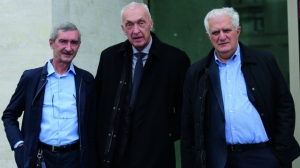BBC: How 'The Three Musketeers' Helped Georgia Fight Coronavirus
In July, the BBC published an article about Georgian epidemiologists Paata Imnadze, Tengiz Tsertsvadze and Amiran Gamkrelidze, entitled “How 'Three Musketeers' Helped Georgia Fight Coronavirus.” The Tbilisi-based author of the article, Rayhan Demytrie, notes that Georgia is enjoying the distinction of being included in the list of 15 non-EU states the European Union considers safe enough to open its borders to, being the only former Soviet republic to achieve that status.
“Fewer than 1,000 cases of COVID-19 have been registered, and 15 people have died out of a population of 3.7 million. A group of public scientists, dubbed the three musketeers, are being praised for steering the Caucasus state's successful response to the pandemic,” the publication reads.
Demytrie further emphasizes that Georgia's first COVID-19 case was registered at the end of February, and the government's response was swift. By mid-March, all schools, universities and non-essential businesses were closed and public transport was suspended.
After the introduction of a state of emergency on March 21, large gatherings and intra-city travel were banned, and nightly curfews were introduced. During the Orthodox Easter, Georgia's most important religious holiday, the authorities banned private transport and closed cemeteries.
“We took note of the pandemic threat a month before the first con fi med case,” Prime Minister Giorgi Gakharia told the BBC via email. “Given our country's specifics, such as our location and small size, we could not use the examples of other countries.”

“An information campaign and regular updates were led by the country's top scientists and Georgia's National Center for Disease Control and Public Health (NCDC). The NCDC's Lugar Laboratory has been a constant target of Russian disinformation, which has accused it of being part of a US secret bio-weapons program.
“But its scientists have led the country's fight against the pandemic,” the BBC correspondent concludes. Following the publication of this and other articles in the world’s media promoting the Georgian government’s efforts to fight the pandemic, a number of opposition members voiced accusations that the ruling party, Georgian Dream, were commissioning articles in the foreign press.
The Georgian Public Broadcaster asked the BBC to answer the allegation, and received the following answer: “It is not true that this article was commissioned. It is true that an advertisement is published on BBC.COM, but BBC News and current news cannot be sponsored. We do not accept political advertising. Like the rest of the BBC News, this article is an independent and impartial piece of journalism that complies with our editorial rules,” the BBC’s press service said.
WHO ARE THE 'MUSKETEERS'?
“In Georgia, the NCDC's scientists have become widely respected for their decision-making. The trio includes the head of the NCDC, Amiran Gamkrelidze, the man in charge of the Lugar lab, Paata Imnadze, and the main virologist, Tengiz Tsertsvadze, who is head of Tbilisi's infectious diseases, Aids and immunology research center. “Another popular figure was the face of the public health campaign, Marina Egubaia, who is the medical head of Tbilisi's infectious diseases hospital,” the BBC reported.
BY ANA DUMBADZE












